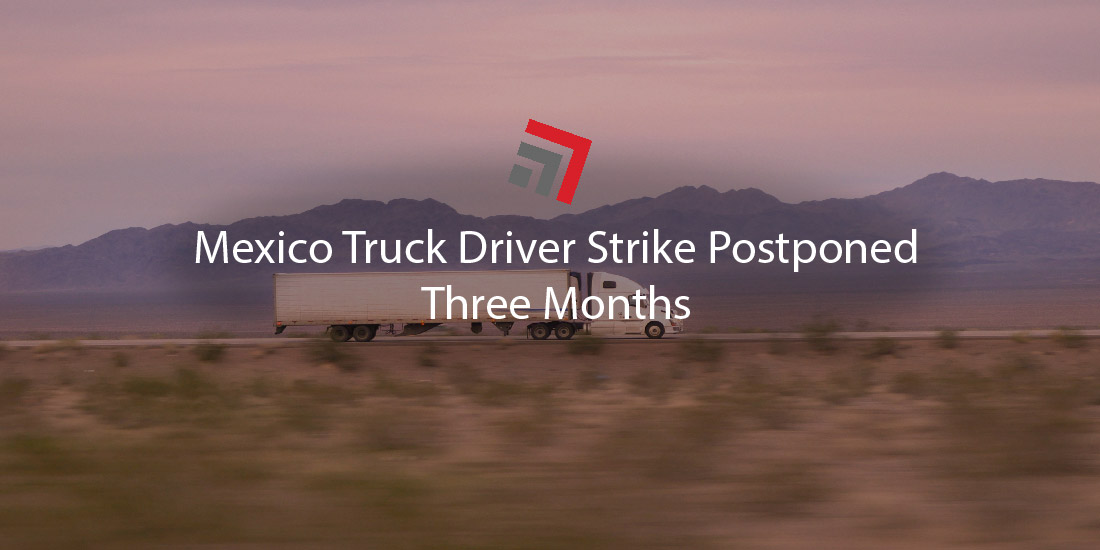The brakes are slammed on a nationwide truck driver strike in Mexico—at least for the time being.
The Mexican Alliance of Carrier Organizations (AMOTAC) has agreed with federal officials to delay this labor-related action by three months after observing initiative from the Mexican government to attend to the group’s labor concerns.
Up until that decision earlier this week, some 300,000 truck drivers across the country were set to strike and protest over the last two days.
The scheduled demonstrations were aimed at bringing attention to a host of safety issues affecting truck drivers. These include rising operating costs, excessive toll fees, extortion by authorities, violence, and cargo theft.
Strike postponed after government extends “good will”
In a statement on Facebook, AMOTAC President Rafael Ortiz confirmed the group’s decision to postpone the strike citing “the good will of the federal government” as the reason.
Part of AMOTAC’s agreement with federal officials includes a monthly meeting between the trucking group and Mexico’s National Guard (the entity responsible for protecting the country’s highways) to discuss safety measures to mitigate cargo theft and violence.
Federal powers also granted truck drivers free use of emergency ramps on the country’s highway network, while also freezing on fines for trucks based on their model year.
Cross-border trade would be severely disrupted
AMOTAC represents an estimated 75 percent of commercial and passenger fleets in Mexico.
The original plan for the nationwide strike, which was scheduled to start this past Tuesday morning, didn’t just call for drivers to play hooky from work.
Rather, organizers proposed blockades on main highways during the two-day demonstration, completely halting traffic.
Such a tactic would decimate domestic and international freight movement south of the border.
While the immediate threat has slid back on the calendar, the looming tension that remains leftover is enough for anyone’s imagination to run rampant.
Clearly, this news concerns cross-border trade and its stakeholders. Whether broker or shipper, many were hyperventilating into brown bags, preparing for the worst, up until Monday.
The temporary truce is surely a positive outcome, but uncertainty remains: “[The strike] is definitively not canceled; it is postponed for three months,” Ortiz said.
AMOTAC warned if the meetings with the National Guard, as well as other concessions made from its agreement with federal officials, don’t yield satisfactory results over the next three months, the group may again call for a nationwide strike.
Plan around labor uncertainty
As depicted on the West Coast earlier this summer, labor uncertainty is a cruel waiting game where disruptions can ravage supply chains in the bat of an eye.
Even with a labor strike unlikely for the next three months, contingency plans should be queued up.
This includes working with logistics partners who can devise routings around (potential) future blockades in Mexico, while also keeping cargo movement dedicated to lesser-impacted highways or tollways.
Final Thoughts
Another point to consider is the scope of participation if a labor strike is carried out. While AMOTAC and 300,000 drivers are expected to picket if their demands are not accommodated, there are other organized divisions of carriers and drivers who have not confirmed whether they will follow suit.
The safety concerns AMOTAC has surfaced impacts all of Mexico’s trucking industry, but given the country’s expansion in trade and lucrative freight rates, other carriers and drivers may not feel inclined to disrupt this growth.
Please contact us if you have any questions regarding this topic or any others in cross-border logistics. In addition, stay up to date with weekly headlines from both trucking and rail via our Road Map newsletter.
More blogs similar to this:



Recent Comments